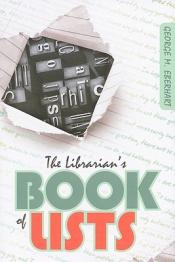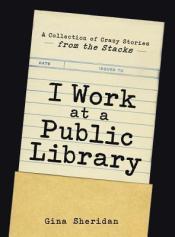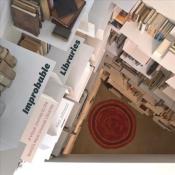
There's far more going on beneath the surface of libraries than most people realize unless they happen to work in a library or know someone who does. And despite our best efforts to use phrases that will make sense to everyone, sometimes library-speak can't help but slip out.
Well, no matter what weird phrase you've heard in the library—from trapping the run to going into the stacks to block shelves—we've got you covered. We've asked staff from all over the Library District to contribute the weirdest phrases they've ever used or heard, and they've been loosely organized into subcategories for ease of reading.
Heard some jargon that's not on the list? Reach out to us on social media to ask for a translation!
- Locations
-
ACLD: Alachua County Library District. The entire library system that spans Alachua County.
The District: Shorthand for Alachua County Library District.
HQ: Headquarters. This is the Library District's main and largest location, situated in downtown Gainesville at 401 East University Ave., Gainesville, FL 32601. Headquarters has many individual departments, which include:
- Tech Services (also TS): Technical Services. This department works behind the scenes to handle the majority of the maintenance tasks for the library collection. Technical Services handles collection development, cataloging items, and processing purchases.
- eBranch: This department focuses on the library website and catalog, as well as the digital resources offered through our website.
- AS: Generally refers to Adult Services, though it can also mean Automated Services. Adult Services runs the adult areas of Headquarters, including the reference desks, and coordinates districtwide programs and initiatives for adults.
- YS: Youth Services. This department runs the youth areas of the Headquarters Library and coordinates districtwide programs and initiatives for teens and children.
- Outreach: Outreach Services. This department coordinates some library services outside of the library buildings, such as deposit collections in a number of community facilities and the library at the Department of the Jail. The mailroom is part of this department, and processes the shipment of homebound materials and interlibrary loans for patrons in addition to regular shipping and receiving. Outreach is also responsible for the bookmobiles when they are in service.
- Circ: This can have several meanings. As for locations, it refers to Circulation Services or the circulation desk. Circulation Services is a department at Headquarters, which checks items in and out, manages Interlibrary Loans (ILL), and handles the tasks associated with managing library accounts. The circulation desk is the main service point at every Library District location.
Branches: All other Library District locations besides Headquarters, both in Gainesville and outlying towns. There are 11 branches in Alachua County.
- Tech Services (also TS): Technical Services. This department works behind the scenes to handle the majority of the maintenance tasks for the library collection. Technical Services handles collection development, cataloging items, and processing purchases.
- Circulation
-
Place a hold: The process of requesting a book be reserved for a specific person. This can be done by library staff or by library cardholders (also called patrons) through the library's website.
Pick list or picklist: A list of items generated by the computer system that fulfill hold requests for patrons. Staff will say they are "pulling the picklist" when they go into the shelves to locate items.
Pull a hold: The act of physically taking an item off the shelf to fulfill a hold request.
Trap a hold: The act of checking an item in when it has been requested by a patron. This will prompt a pop-up stating that the book is on hold for a patron at that location, or that it must be sent to another location.
The run: The daily courier route that transfers books, CDs, DVDs, and other items from one location to another. Most items must be routed through Headquarters before they can travel to another branch, which is why the holds process may take several days. You may hear staff say they are "trapping the run," which means they are processing the delivery from the courier that day by checking items in to trap each individual hold.
Hold status:
- Pending: You are on hold for an item and there is at least one copy of it checked in at a Library District location. This hold has not been processed by library staff yet.
- Active: You are on hold for an item but all copies are currently checked out. Your hold will be processed and fulfilled when a copy has been returned.
- Located: A status similar to transferred (below) used by some locations, particularly the Big 3 (Headquarters and Millhopper and Tower Road branches). This means a staff member has found the item on the shelf but has not processed it further.
- Transferred: This item has been checked in at its current location and the system has flagged it to fulfill a hold at a different location. The courier will pick it up to deliver it to its new location.
- Held: This item is on the holds' shelf at the correct location and has been reserved for the patron who requested it. It will remain on the holds' shelf for seven business days for the requester to check it out. If the hold is not picked up in those seven days, it reaches its expiration date and is either returned to the shelves or trapped for the next person in line.
- Unclaimed: The hold was not picked up before the expiration date.
- Cancelled: The patron or staff cancelled the hold. Staff may have to cancel a hold if the item is not available. Cancelled holds for items can be reactivated by staff upon request, but it is not guaranteed that they will be available immediately.
ILL: Interlibrary Loan. These are books that have been requested by patrons but must come from outside of the Library District because the library does not own a copy and cannot purchase it. ILLs must have been published for at least 6 months and can only be accessed by Alachua County residents.
Checkout receipt: Also called a due date slip or receipt. This slip of paper shows the date and location, as well as all the items you checked out during your visit and their individual due dates.
Claims list or claims returned list: A list of items patrons believe they have returned but were not checked in properly. Library staff search multiple times for the items on the list. Items remain on the list for a year. The library collection is inventoried every year, so this provides additional time for an item to be located. The year also allows patrons to search for items at home, in case it was accidentally misplaced.
Dam/mis: Items returned damaged or missing parts (such as a CD in an audiobook). Circulation staff has forms that they use to process these items correctly.
- Pending: You are on hold for an item and there is at least one copy of it checked in at a Library District location. This hold has not been processed by library staff yet.
- Library Software
-
ILS: Integrated Library System. An ILS is comprised of multiple, interactive parts, including a database, software for interacting with the database, a staff interface, and a patron interface.
Polaris: Polaris is the Integrated Library System used by the library, from the company Innovative Interfaces, Inc. Library staff often use Polaris to refer specifically to the software version of the ILS, but it is an umbrella term for the software and web-based versions of the ILS.
The client: Another term for the software version of the ILS. Currently only used by Technical Services and other behind-the-scenes staff.
Leap: The web-based version of Polaris that library staff currently use for circulation tasks, including check-in, check out, and processing hold requests.
PAC: Public Access Catalog. This is the version of the library's collection database that you see when you search for items on the library's website.
Boolean search: A type of search that allows you to combine words or phrases using AND, OR, or NOT, to limit or expand your search. For instance, if you search "horses AND ponies," you will only get items that include both words; if you search "horses OR ponies," you will receive results with either word, but no guarantee of both. And if you search "horses NOT ponies" you will only receive items with the word horses that do not include the word ponies as well.
MyPC: The library's computer reservation system. This can be used by staff to print guest passes, check computer availability status, and interface with the patron printers to assist when there are printing difficulties.
Guest pass: A temporary login that mimics a library card for patrons who do not have one. Patrons can use this pass to log in on internet computer stations and when printing.
- Online Services
-
Databases: Digital resources that the library provides free access to for patrons. Many may require a library card number to access when not used on library computers. Some are only available to Alachua County residents. Previously called eSources.
Digital media: Media that is available through the library's website or databases. Most often thought of as eBooks, this category also includes eVideos, eMusic, eAudiobooks, and eMagazines.
Beanstack: A website for participating in various reading challenges hosted or promoted by the library. Beanstack can be used to log books, write reviews, and receive reading recommendations year-round, not just during Summer at the Library.
Ask-A-Librarian: A service coordinated on the state-level in Florida that provides real-time access to librarians to answer all your reference questions – available from 10 a.m. to midnight Sunday through Thursday, and from 10 a.m. to 5 p.m. Friday and Saturday. Library District librarians participate in Ask-A-Librarian, but when you use the service, you may get a librarian from anywhere in Florida.
Purchase request: A form that can be completed to suggest titles for the library to add to the collection. Not every material suggested is available for purchase through the library, in which case an ILL request may be appropriate.
- The Collection
-
Serials: Magazines and newspapers. Older issues of magazines may be available for check out. Also referred to as ephemerals.
YA: Young Adult. Most often refers to materials meant for youth aged 12- to 18-years-old, though anyone can enjoy these titles.
jFic: Juvenile fiction. These can range from very short chapter books meant for young children who are just becoming comfortable reading on their own, to very long books that appeal to middle schoolers and young high schoolers. Often, the font is larger than YA or adult fiction, and there are fewer lines per page.
E Begin: Also known as Early Readers, these books are helpful for young children who are just learning to read on their own.
Easy: Picture books. Young children may be able to read picture books on their own, but they are generally intended to be read by an adult to a child.
Playaway: A digital version of audiobooks on CD that is very similar to an MP3 player. The device contains the audio file for a single book. Just add batteries and your headphones.
Graphic novels: A specific format of books that integrates images with the text in such a way that the story would be incomplete if only one side were available for viewing. This is a format, rather than a genre; graphic novels can be about any topic that print books are published on.
Manga: Comics or graphic novels that originate in Japan, though the Library District uses the word manga to refer to all graphic materials that are read right to left and back to front.
Call number: A shorthand label for what a book is about. In many public libraries, call numbers are organized using the Dewey Decimal System. The call number also acts as an address of where to find an item on the shelf, relative to the rest of the collection.
- Collection Maintenance
-
The stacks: The physical space where the collection is housed, including individual bookshelves and the larger bays made up of bookshelves. When someone is "in the stacks" it may mean that they are shelving books, pulling the picklist, or completing other tasks related to collection maintenance.
Blocking shelves: The act of lining books or other materials up with the front edge of the shelf. This is done on a regular basis by library staff to keep the shelves looking neat. Items are aligned with the front of the shelf to make it easier to read their spine labels.
Shelf reading: The process of checking the spine label on every book to make sure they are in the correct order on the shelf. When shelf reading fiction titles, staff check the author followed by the titles; when shelf reading nonfiction, staff check the call number followed by the author.
Cutter: The origin of this term lies with the Cutter Expansive Classification system. Today, it is often used colloquially to mean the process of classifying a book, determining the correct call number, and creating a spine label. To "re-cutter" a book means changing its call number, usually for the sake of consistency; for instance, the Pete the Cat books were recently re-cuttered from "Dean, J" or "Dean, K" to "PETE."
Weeding: The process of removing materials from the collection. Items may be weeded due to poor condition, outdated information, or the availability of an updated version of the title. This is a natural process and is not a form of censorship. May also be called deaccession or withdrawals.
Float: The process of moving items from one location to another. This may be done to free up shelf space at the sending location or to keep the collection current and relevant for the community that visits that location. Additionally, the Library District has a floating collection, which means that an item returned to a particular location will stay at that location, regardless of where it was checked out from. This helps to keep the collection fresh and current at all locations.
- Continuing Education
-
MLS, MSLS, MLIS, or MSI: The master's degree required for most professional librarian positions in the United States. The name of this degree has changed multiple times over the past several decades, and may still vary between institutions. Library staff use all of these terms interchangeably, though they have slightly different meanings:
- MLS: Master of Library Science. Similar to MSLS below. The older phrase that is still often used by graduate programs and librarians to denote the education they received
- MSLS: Master of Science in Library Science. See above.
- MLIS: Master of Library and Information Science. An updated title meant to highlight the increasing importance of information and technology in the library field, both for staff and patrons.
- MSI: Master of Science in Information. The current title of the graduate program at Florida State University, where many Library District librarians earn their degrees. The focus is placed on information and connecting people with information, rather than on the library as a place.
ALA: The American Library Association. A nonprofit organization that promotes libraries and library education. Many Library District staff are ALA members.
PLA: The Public Library Association. A division of the ALA that is focused on supporting public libraries and their staff.
NEFLIN: Northeast Florida Library Information Network. An organization made up of member libraries that provides training, resource sharing, grant opportunities, and other services to those member libraries. The Library District is a member of NEFLIN.
Webinar: A seminar that is taught online rather than in-person. Most webinars are one to two hours long. NEFLIN is one organization that provides webinars that staff watch to continue improving their skills and knowledge.
- MLS: Master of Library Science. Similar to MSLS below. The older phrase that is still often used by graduate programs and librarians to denote the education they received
- Staff Titles
-
Note: This section does not cover every position or classification within the Library District, only the most common ones and the positions that are commonly confused by both patrons and staff.
Library Assistant (LA): This position is concerned primarily with circulation tasks, such as checking items out, creating new library cards, and processing holds. Likely the person or people you see the most often when you go to the circulation desk of your local library. These are also the staff you will most likely encounter shelving books, organizing the shelves, and pulling holds.
Library Specialist (LS): This position is concerned primarily with planning and hosting library programs and other events. In most locations, a specialist or team of specialists works directly with a librarian to provide programs for a specific age group, such as children, teens, or adults. This is not a supervisory position.
Library Services Supervisor (LSS): A supervisory position that oversees the Library Assistants in large branches and departments, and may also oversee collection maintenance tasks. This position does not require a master's degree and is often confused with Senior Library Specialists and Librarian Supervisors (see below). A small number of these positions exist.
Senior Library Specialist (SLS): Informally considered the halfway step between a Library Specialist and a Librarian. This is not a supervisory position. It usually exists in small branches that do not have librarians, but need an official designated Person in Charge when the Library Manager is not available. A small number of these positions exist.
Librarian: The classic job that people think of when they consider libraries. This position requires a master's degree and works with Library Specialists to provide services and programs to their community. This position may or may not supervise other workers. Nearly every Library District location has at least one librarian on staff.
Librarian Supervisor: Often informally called the "Assistant Branch Manager." This position supervises staff at larger branches or departments and acts in the manager's stead when they are not available. A small number of these positions exist.
Library Manager: An administrative position that supervises and coordinates the activities of their branch or department. Every branch/department has a manager.
Public Service Administrator (PSA): An administrative position that oversees the branches and departments of the Library District. A PSA is the direct supervisor of several managers. They work together to ensure the Library District is running smoothly. A small number of these positions exist.
Library Director: The chief administrator of the Library District, who works directly with the Governing Board and the Library Board of Trustees to ensure the Library District runs smoothly. The current Library Director is Shaney T. Livingston.
Can't get enough of libraries? Here are some books that detail the wacky, wild things that happen in libraries around the world every day!

Librarian Tales: Funny, Strange, and Inspiring Dispatches from the Stacks by William Ottens
"Here is the good, the bad, and the ugly of librarian William Ottens’s experience working behind service desks and in the stacks of public libraries, most recently at the Lawrence Public Library in Kansas. In Librarian Tales, published in cooperation with the American Library Association, readers will learn about strange things librarians have found in book drops, weird and obscure reference questions, the stress of tax season, phrases your local librarians never want to hear, stories unique to children’s librarians, and more.
Ottens uncovers common pet peeves among his colleagues, addresses misguided assumptions and stereotypes, and shares several hilarious stories along the way. This book is a must-read for any librarian, or anyone who loves books and libraries. Although non-library folks will also laugh and cry (from laughing) while reading this lighthearted analysis of your local community pillar, the library."

"After years spent editing American Libraries and the many editions of The Whole Library Handbook, George Eberhart has collected a raft of arcane librariana and amusing trivia for this endlessly browsable volume. Equally suitable for the reference shelf and the staff lounge, the dozens of wide-ranging lists in this book include:
- 14 ways libraries are good for the country
- How to say "Where is the library?" in 50 different languages
- 10 intriguing paper defects
- 6 library-related birdsongs
- Top 12 silly reasons to ban a book"

This Is What a Librarian Looks Like: A Celebration of Libraries, Communities, and Access to Information by Kyle Cassidy
"In 2014, author and photographer Kyle Cassidy published a photo essay on Slate.com called "This is What A Librarian Looks Like," a montage of portraits and a tribute to librarians. Since then, Cassidy has made it his mission to remind us of how essential librarians and libraries are to our communities. His subjects are men and women of all ages, backgrounds, and personal style-from pink hair and leather jackets to button-downs and blazers. In short, not necessarily what one thinks a librarian looks like. The nearly 220 librarians photographed also share their personal thoughts on what it means to be a librarian. This is What A Librarian Looks Like also includes original essays by some of our most beloved writers, journalists, and commentators including Neil Gaiman, George R.R. Martin, Nancy Pearl, Cory Doctorow, Paula Poundstone, Amanda Palmer, Peter Sagal, Jeff VanderMeer, John Scalzi, Sara Farizan, Amy Dickinson, and others. Cassidy also profiles a handful of especially influential librarians and libraries."

The Card Catalog: Books, Cards, and Literary Treasures
"The Library of Congress brings booklovers an enriching tribute to the power of the written word and the history of our most beloved books. Featuring more than 200 full-color images of original catalog cards, first edition book covers, and photographs from the library's magnificent archives, this collection is a visual celebration of the rarely seen treasures in one of the world's most famous libraries and the brilliant catalog system that has kept it organized for hundreds of years. Packed with engaging facts on literary classics from Ulysses to The Cat in the Hat to Shakespeare's First Folio to The Catcher in the Rye this package is an ode to the enduring magic and importance of books."

I Work at a Public Library: A Collection of Crazy Stories from the Stacks by Gina Sheridan
"From a patron's missing wetsuit to the scent of crab cakes wafting through the stacks, I Work at a Public Library showcases the oddities that have come across Gina Sheridan's circulation desk. Throughout these pages, she catalogs her encounters with local eccentrics as well as the questions that plague her, such as, "What is the standard length of eyebrow hairs?" Whether she's helping someone scan his face onto an online dating site or explaining why the library doesn't have any dragon autobiographies, Sheridan's bizarre tales prove that she's truly seen it all.
Stacked high with hundreds of strange-but-true stories, I Work at a Public Library celebrates librarians and the unforgettable patrons that roam the stacks every day."

Improbable Libraries: A Visual Journey to the World's Most Unusual Libraries by Alex Johnson
"How do you use your local library? Does it arrive at your door on the back of an elephant? Can it float down the river to you? Or does it occupy a phone booth by the side of the road?
Public libraries are a cornerstone of modern civilization, yet like the books in them, libraries face an uncertain future in an increasingly digital world. Undaunted, librarians around the globe are thinking up astonishing ways of reaching those in reading need, whether by bike in Chicago, boat in Laos, or donkey in Colombia. Improbable Libraries showcases a wide range of unforgettable, never-before-seen images and interviews with librarians who are overcoming geographic, economic, and political difficulties to bring the written word to an eager audience. Alex Johnson charts the changing face of library architecture, as temporary pop-ups rub shoulders with monumental brick-and-mortar structures, and many libraries expand their mission to function as true community centers. To take just one example: the open-air Garden Library in Tel Aviv, located in a park near the city’s main bus station, supports asylum seekers and migrant workers with a stock of 3,500 volumes in sixteen different languages."